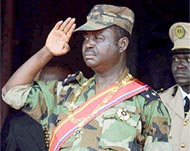Darfur conflict threatens to spread
The central African region could be destabilised by the spillover from the conflict in Darfur, say observers.

Since the war in Sudan erupted in 2003, rebel groups have formed in Chad and are beginning to emerge in the Central African Republic (CAR), which shares a border with both the states.
The victims of the widening conflict are people such as Khadija Yaya Moussa, a Chadian woman who fled her home after an attack by Sudanese Arabic-speaking militias known as the Janjaweed.
“I hid the children in the house during the attack,” she said softly, speaking through a translator. “The Janjaweed came on cattle raids before, but now they are killing people.”
Now she welcomes strangers into her front room by rolling out a mat under a tree. On a vine to her left hang sunglasses and a kettle; to her right her three children huddle on a bare bedstead.
It’s all they have left after fleeing the Janjaweed raids. Moussa believes the community was punished because it offered to shelter Sudanese refugees.
Rebel emergence
Humanitarian workers say that in addition to more than two million people in Sudan who have fled the fighting, cross-border raids and civil war have displaced more than 65,000 people within Chad.
|
“The Janjaweed came on cattle raids before but now they are killing people” Khadija Yaya Moussa |
Since war broke out in Darfur, three major rebel groups have emerged and the government has armed Arabic-speaking militias that fight alongside the regular armed forces.
Many of the Sudanese rebels come from the same tribe as Idriss Deby, the Chadian president.
For the first few years of the rebellion, Deby tried to avoid antagonising his powerful neighbour by openly supporting the rebels, yet turned a blind eye if members of his government chose to do so.
But last year, relations between Chad and Sudan soured, with both countries accusing the other of supporting rebel groups on each other’s territories.
Infighting
The situation is complicated by defections from Deby’s inner circle who have formed their own rebel group in Chad and accuse Deby of not doing enough to support their kinsmen in Sudan.
Observers also say the defectors were angered by his decision to seek a third term in this month’s elections.
Since Chad began exporting oil a few years ago, many of his own family had been eyeing the presidency.
“Chad‘s crisis is homegrown but converging dangerously with the conflict in Darfur. These crises feed off of one another, and, inevitably, civilians are caught in the middle,” says Colin Thomas-Jenson of the International Crisis Group.
 |
|
Bozize has lodged a complaint |
“The CAR is involved because northern CAR is essentially ungoverned and, therefore, a useful rear base for attacks on Chad. You cannot solve one conflict in the region without addressing the others.”
Adam Rakiss, a 41-year-old who says he is a colonel in the CAR, is one of about 235 rebels seized after a major rebel assault on the Chadian capital, N’Djamena, in mid-April.
He says Sudan promised the CAR fighters that if they helped topple Deby, they would be provided bases from which to launch their own rebellion.
Official complaint
“If we help Mohamet Nour [a rebel leader] take power in Chad, Sudan will help us,” he said, adding that he had arrived with about 20 fighters from the CAR.
Francois Bozize, the president of the CAR, came to power three years ago in a coup backed by Chad.
Last week his foreign minister lodged an official complaint with Sudan regarding two planes that had allegedly landed in the north of the country carrying 100 mercenaries.
|
“These crises feed off of one another, and, inevitably, civilians are caught in the middle” Colin Thomas-Jenson, International Crisis Group |
Military observers believe that the CAR is being used as a base by Sudanese-backed rebels for incursions into Chad.
The UN secretary-general, Kofi Annan, has expressed concern over the escalation of the conflict, but Olivier Bercault of Human Rights Watch says the availability of automatic weapons, porous borders and weak government means the Darfur conflict will almost certainly suck in all of its neighbours.
“The dynamic is unfortunately something we know very well. We already saw in eastern Congo with the war in Rwanda coming to Congo and in West Africa,” he said.
“One country sets an entire region afire… In western Sudan and eastern Chad, and CAR, its exactly the same pattern.”